
70% of people would back free movement with new restrictions on EU citizens. But LSE poll looks fatally flawed - would these proposals survive serious debate? Detailed thread. 1/24
https://twitter.com/lsebrexitvote/status/1172459235940163584
(ICMYI I spent 20 years representing EU citizens vs Home Office. For 3 years I've been questioning mainstream Lab & Lib ideas that Theresa May's Home Office could impose new, useful restrictions.) 2/
Context first:
- *some* EU states require EU citz to register after 3 months presence (optional in UK & Ireland)
*some* EU states make their citz carry ID cards, & do the same to EU cits (Sweden & others don't) 3/
- *some* EU states require EU citz to register after 3 months presence (optional in UK & Ireland)
*some* EU states make their citz carry ID cards, & do the same to EU cits (Sweden & others don't) 3/
- all EU states (incl UK) have national law powers to expel EU citz who don't meet registration conditions & aren't genuine jobseekers
- all EU states use expulsion - but only really on public policy grounds (criminal threat) 4/
- all EU states use expulsion - but only really on public policy grounds (criminal threat) 4/
Other EU citz don't get expelled because:
- appeals take time & it has to stop as soon as EU cit gets a job or becomes a genuine jobseeker
- expelled EU cit can just return as a visitor or genuine jobseeker.
Officials spend time expelling non-EU citz without these rights 5/
- appeals take time & it has to stop as soon as EU cit gets a job or becomes a genuine jobseeker
- expelled EU cit can just return as a visitor or genuine jobseeker.
Officials spend time expelling non-EU citz without these rights 5/
I'm not saying EU states *never* expel EU citz except for criminality. But no evidence of any significant nos.
Instead of expulsion, states deny benefits, housing to force EU citz to either become workers/jobseekers - or leave. 6/
Instead of expulsion, states deny benefits, housing to force EU citz to either become workers/jobseekers - or leave. 6/
The new poll
LSE asked 4 Qs of 1000 people about their knowledge of EU law & practice - and what would be "enough control over EU immigration".
But the 1000 were given seriously false info & impressions about UK and EU27 law & practice. 7/
LSE asked 4 Qs of 1000 people about their knowledge of EU law & practice - and what would be "enough control over EU immigration".
But the 1000 were given seriously false info & impressions about UK and EU27 law & practice. 7/
Q1: 'should there continue to be complete freedom for people from the rest of the EU to live in Britain'.
But 'complete freedom' isn't the legal *or factual* position in UK. So every interviewee answered questions on a fundamentally wrong basis. 8/
But 'complete freedom' isn't the legal *or factual* position in UK. So every interviewee answered questions on a fundamentally wrong basis. 8/

Before EU settlement scheme, Home Office used EU law to deport 5,000 EU citizens per year independent.co.uk/news/uk/politi…
That's not 'complete freedom to live'.
And Home Office already has a "3 month rule", as LSE notes accept.
Were interviewees told? 9/
That's not 'complete freedom to live'.
And Home Office already has a "3 month rule", as LSE notes accept.
Were interviewees told? 9/

Q2 doubled down on misleading impressions contrasting "no restrictions" (as if that's current UK practice) with 3 month rule and "allowable restrictions" that other EU countries "enforce".
Interviewees weren't told what these "enforced restrictions" are - neither are we 10/
Interviewees weren't told what these "enforced restrictions" are - neither are we 10/

By Q3, interviewees have a clear choice: "complete freedom to stay" with May, Javid & Patel or an "enforced" 3 month rule on people who are not "working, studying or with enough money to support themselves"
The first choice is false - and so is the second 11/
The first choice is false - and so is the second 11/

Under EU law the Home Office cannot enforce removal on genuine job-seekers - no matter how long they stay.
Spelt out in Article 14(4)(b) of Citizens Directive 2004/38 12/
Spelt out in Article 14(4)(b) of Citizens Directive 2004/38 12/
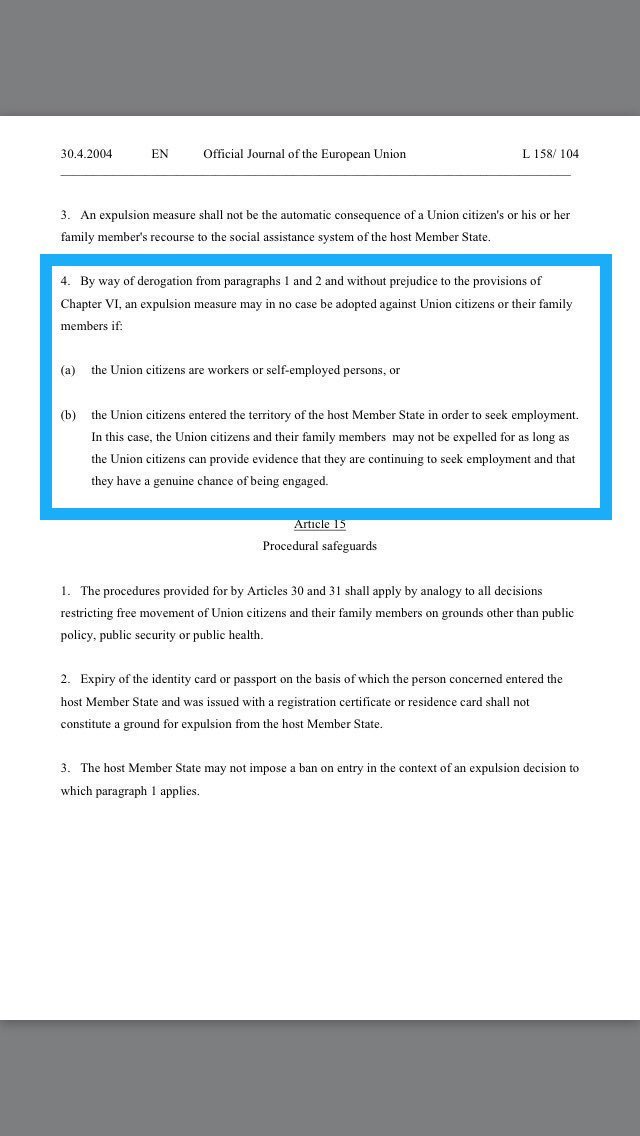
The prohibition on deporting jobseekers is crucial, but ignoring it is common in this debate, even though its crucial.
Citizens Assembly for Brexit was given wrong info on this too: citizensassembly.co.uk/immigration-wo… 13/
Citizens Assembly for Brexit was given wrong info on this too: citizensassembly.co.uk/immigration-wo… 13/

Jobseekers aren't the only non-workers with an EU law right to stay. There's a long long list:
https://twitter.com/SimonFRCox/status/1063207305314017281?s=2014/
It seems LSE didn't tell interviewees about any of these other rights not to be expelled, though their notes refer to jobseekers.
So interviewees were given the false impression that rights to remain are only for people in work, studying or with private means. 15/
So interviewees were given the false impression that rights to remain are only for people in work, studying or with private means. 15/
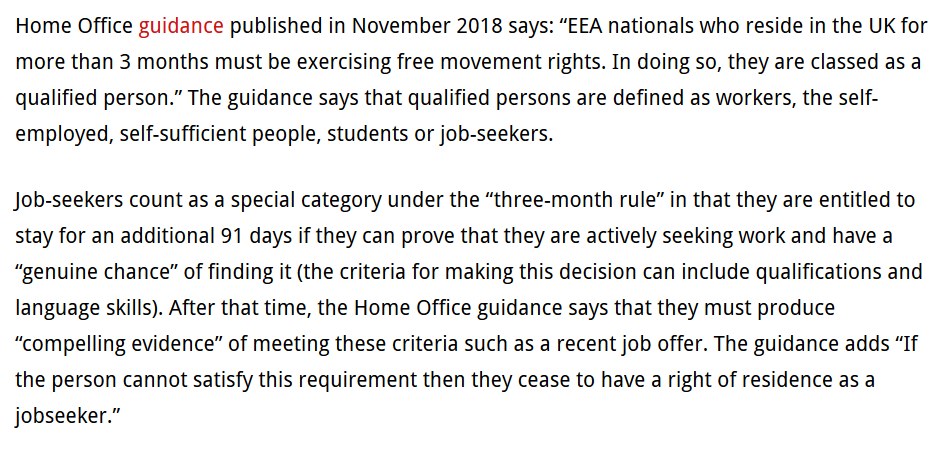
LSE's Q4 told interviewees that if everyone in UK had to carry an ID card, this would make it "possible for the authorities to enforce immigration rules that apply in other EU countries".
But there is no evidence that other EU countries *enforce* rules more than UK does. 16/
But there is no evidence that other EU countries *enforce* rules more than UK does. 16/
We don't know what LSE's interviewees understood by "enforce immigration rules".
It means "deportation" to me.
There is no evidence that other EU countries deport EU citizens more than UK does, or in different situations. 17/
It means "deportation" to me.
There is no evidence that other EU countries deport EU citizens more than UK does, or in different situations. 17/
Belgian law requires everyone to carry national ID. Nick Clegg claimed they "enforce" rules. But when I asked Belgium’s anti-migrant minister, he had not figures of EU citz *actually removed* under the "3 month rule". 



https://twitter.com/SimonFRCox/status/1166250919123673088?s=2018/


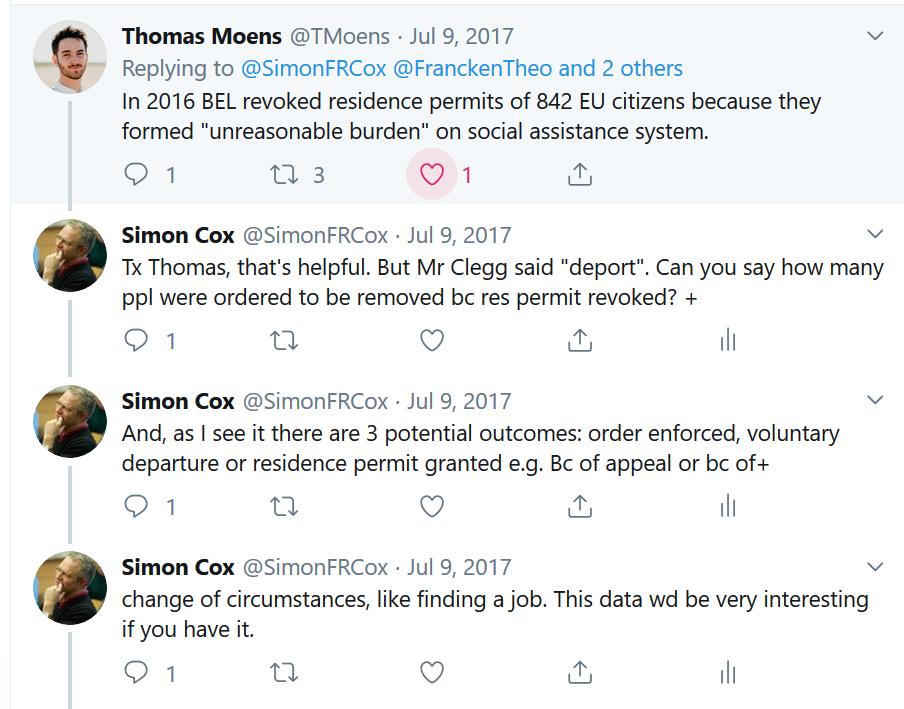
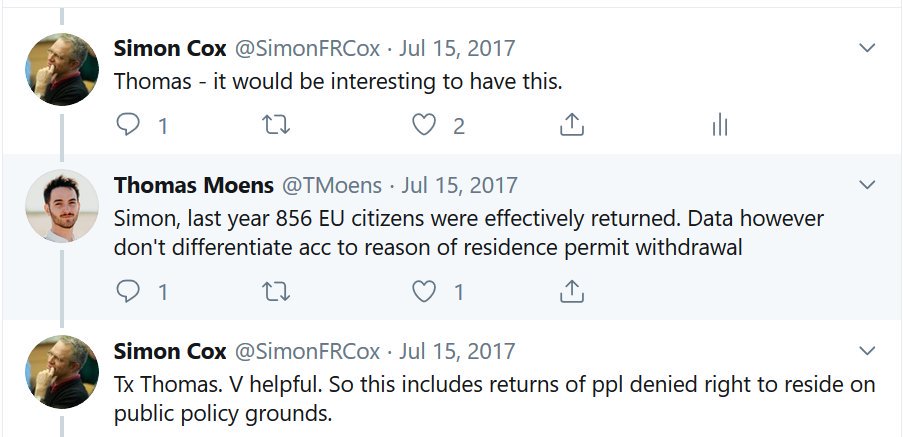
Despite 3 years of asking, I've never found a report of person actually expelled from Belgium on these grounds. For one forgetful guy, a Belgian expulsion letter just reminded him to register. 19/ 
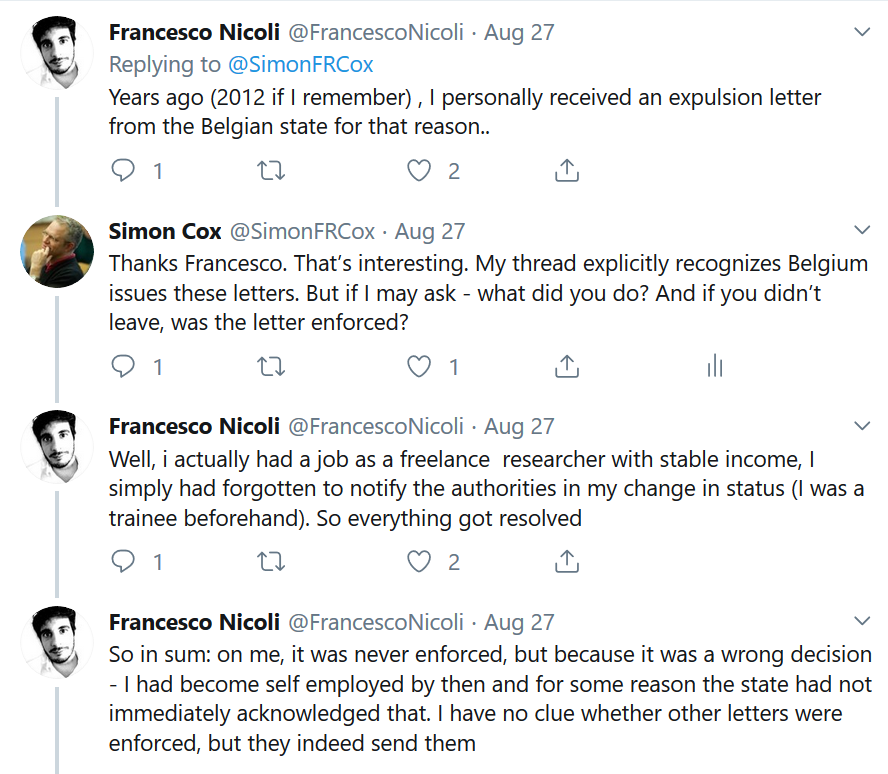
I'm not saying no-one gets expelled. I'm saying there is no evidence that any EU country *enforces* EU residence law more harshly than the Home Office.
Unless you count filling in a form as "enforcement" - in which case, lets be clear that's what we mean. 20/
Unless you count filling in a form as "enforcement" - in which case, lets be clear that's what we mean. 20/
UK authorities seriously enforce EU law. UK law bars EU citizens from cash benefits, homelessness accommodation & other rights unless they can *prove* their right to reside, with current documents about work, work-seeking, family etc.
But were LSE's interviewees told that?
21/
But were LSE's interviewees told that?
21/
Under Theresa May and Amber Rudd, the Home Office systematically broke EU law in its attempts to deport EU citizens.
https://twitter.com/SimonFRCox/status/1082318772122341376?s=2022/
It's not possible for a survey to tell interviewees all this info. But this survey presented a false image that EU citz *currently enjoy* complete freedom to stay in UK, while other EU states are actually expelling EU citz who don't have rights to reside. Neither is true. 23/
We learn that if people are presented with this false picture, 70% are OK with either the "current" or the "enforced" EU law.
We don't know whether people would see it that way if they knew how similar "current" and "enforced" actually are. 24/24
We don't know whether people would see it that way if they knew how similar "current" and "enforced" actually are. 24/24
• • •
Missing some Tweet in this thread? You can try to
force a refresh








